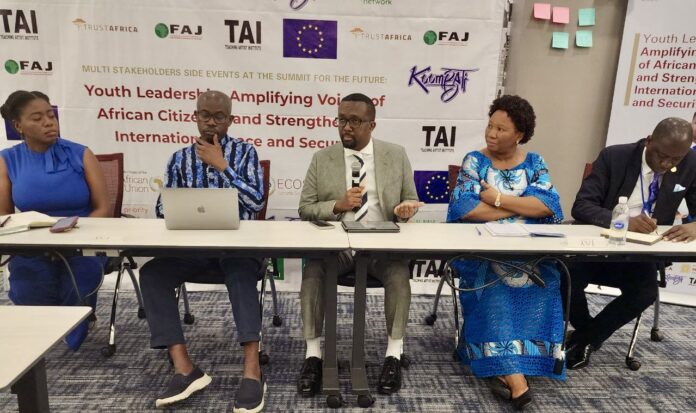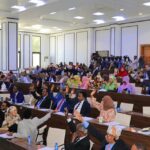New York City—In a compelling address at the African Union’s side event during the Future Action Days summit, Omar Faruk Osman, a prominent advocate for journalists’ rights and labor issues in Africa, underscored the critical role of civil society in fostering peace and security across the continent.
As President of the Federation of African Journalists (FAJ) and secretary general of both the National Union of Somali Journalists (NUSOJ) and the Federation of Somali Trade Unions (FESTU), Osman’s insights resonated with a diverse audience of policymakers, activists, and civil society leaders.
A Call for Enhanced Protection
In a world increasingly defined by conflicts and instability, Osman opened his speech with a powerful assertion: “The safety and security of journalists are not just individual rights; they are foundational to the health of our democracies and the stability of our nations.” He emphasized the necessity of strengthening the African Peace and Security Architecture (APSA) to create an environment where media professionals can operate without fear of violence or censorship.
Osman argued that the protection of journalists is vital for confronting impunity, which has become a pervasive issue in many African nations. “When journalists are silenced, accountability is lost, and the truth remains buried,” he stated, urging African governments to implement comprehensive protections for media personnel, particularly those working in conflict zones. He called for collaborative frameworks that involve governments, civil society, and international organizations to safeguard journalistic freedom.
Conflict-Sensitive Reporting as a Path to Peace
Moving beyond safety concerns, Osman delved into the transformative power of conflict-sensitive reporting and peace journalism. “In the context of peacekeeping and peacebuilding missions, the media must be seen as a vital ally,” he remarked. He highlighted the need for journalists to adopt frameworks that prioritize peace and reconciliation in their reporting.
By promoting narratives that foster understanding and dialogue, journalists can play a pivotal role in de-escalating tensions and rebuilding trust within communities. “Our stories can either ignite conflict or pave the way for peace,” Osman asserted. He urged journalists to engage in responsible reporting practices that reflect the complexities of conflicts while promoting solutions rather than sensationalism.
Addressing Economic Injustices
Osman’s address also tackled the pressing issue of the decent work deficit, which he identified as a fundamental root cause of crises and conflicts across Africa. He emphasized that poverty and lack of decent employment opportunities are significant contributors to societal instability. “When individuals are denied the dignity of work, desperation and unrest are inevitable,” he stated.
He called on African governments to prioritize job creation and labor rights as integral components of their national strategies. “Economic empowerment is a pathway to peace. By investing in decent work opportunities, we lay the groundwork for a stable and equitable society,” Osman explained. He urged policymakers to recognize that economic injustices cannot be separated from broader peace and security initiatives.
A Collective Responsibility
Osman concluded his powerful address with a call to action that resonated deeply with his audience. “It is our collective responsibility—governments, civil society, and the media—to forge a future where peace is not just an aspiration but a reality,” he declared. He implored leaders to prioritize the protection of journalists and labor rights within their policy frameworks, reinforcing the notion that these elements are intertwined with sustainable peace.
The dialogue at the African Union’s event highlighted a crucial recognition of the interconnectedness between civil society, media freedom, and economic justice in addressing Africa’s multifaceted challenges. As countries across the continent grapple with crises ranging from political instability to economic downturns, Osman’s insights serve as a timely reminder of the roles that journalists and labor advocates play in building a more stable and just Africa.
A Vision for the Future
As the summit continues, the themes raised by Osman are expected to influence discussions and actions within the African Union and beyond. His advocacy for the protection of journalists and the promotion of decent work resonates with a growing movement aimed at harnessing civil society’s potential to drive positive change.
In a world often fraught with division, Osman’s vision for a peaceful Africa, bolstered by a robust media and equitable labor practices, provides a hopeful path forward. The summit has not only shed light on the urgent need for protective measures and responsible reporting but has also reaffirmed the essential role of civil society in nurturing the seeds of peace and reconciliation across the continent.
This crucial moment requires a unified effort to implement strategies that uphold the truth in journalism and cultivate a just, equitable society throughout Africa. The energy and momentum from the summit must lead to tangible change, ensuring that marginalized voices are not only heard but also empowered and safeguarded.





